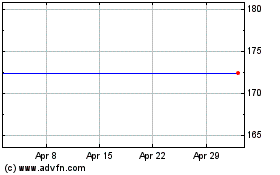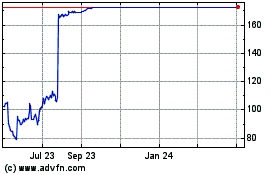Reata to Present Preclinical Data on RTA 1701, a Novel RORγt Inverse Agonist, at Upcoming Immunology Conference
April 03 2018 - 7:30AM

Novel, Orally-Bioavailable Agent With Potent Activity in
Cell-Based and Animal Models
Reata Pharmaceuticals, Inc. (Nasdaq:RETA) (Reata or Company), a
clinical-stage biopharmaceutical company, today announced the
upcoming presentation of preclinical data for its novel RORγt
inverse agonist RTA 1701 at the Annual Meeting of the American
Association of Immunologists in Austin, Texas on May 6-7,
2018. RTA 1701 is the lead product candidate from Reata’s
proprietary series of RORγt inverse agonists for the potential
treatment of a broad range of autoimmune, inflammatory, and
fibrotic diseases. RTA 1701 is an orally-bioavailable,
RORγt-selective, inverse agonist that demonstrates strong efficacy
in rodent disease models. RTA 1701 potently suppresses
production of IL-17A, a clinically important cytokine, in human
immune cells and when dosed orally to non-human primates.
Reata will present key preclinical data
characterizing RTA 1701 in the following sessions:
- Dulubova et al., “RTA 1701 is an orally-bioavailable, potent,
and selective RORγt inhibitor that suppresses Th17 differentiation
in vitro and is efficacious in mouse models of autoimmune
disease.” May 6, 2:30 pm CT.
- Reisman et al., “RTA 1701 is an oral RORγt inhibitor that
suppresses the IL-17A response in non-human primates.” May 7,
2:30 pm CT.
“Our data with RTA 1701, and especially our
primate proof-of-concept experiments, are highly encouraging,” said
Keith Ward, Ph.D., Reata’s Chief Development Officer. “We
believe that a high, unmet need remains for patients with
autoimmune and inflammatory disorders, and that RTA 1701 represents
a promising small molecule development candidate in these
indications.” RTA 1701 was discovered by Reata, who holds
global rights for the asset.
Reata plans to continue the development of RTA
1701 with a first-in-human study in 2018 that includes evaluation
of IL-17A suppression with initial results expected by 1H19.
About RORγt
RORγt is the key transcription factor that
orchestrates the differentiation of Th17 cells and drives
production of key pro-inflammatory cytokines, including
IL-17A. Aberrant IL-17A signaling has been implicated in many
diseases, including chronic inflammatory and autoimmune diseases
such as rheumatoid arthritis, psoriasis, inflammatory bowel
disease, multiple sclerosis, and many others. Therefore,
suppression of activity of RORγt via an inverse agonist such as RTA
1701 has the potential for broad activity across multiple
therapeutic areas of high, unmet medical need.
About Reata Pharmaceuticals,
Inc.
Reata is a clinical-stage biopharmaceutical
company that develops novel therapeutics for patients with serious
or life-threatening diseases by targeting molecular pathways
involved in the regulation of cellular metabolism and inflammation.
Reata’s two most advanced clinical candidates, bardoxolone
methyl and omaveloxolone, target the important transcription factor
Nrf2 that promotes the resolution of inflammation by restoring
mitochondrial function, reducing oxidative stress, and inhibiting
pro-inflammatory signaling.
Forward-Looking Statements
This press release includes certain disclosures
that contain “forward-looking statements,” including, without
limitation, statements regarding the success, cost and timing of
our product development activities and clinical trials, our plans
to research, develop and commercialize our product candidates, and
our ability to obtain and retain regulatory approval of our product
candidates. You can identify forward-looking statements because
they contain words such as “believes,” “will,” “may,” “aims,”
“plans,” and “expects.” Forward-looking statements are based
on Reata’s current expectations and assumptions. Because
forward-looking statements relate to the future, they are subject
to inherent uncertainties, risks, and changes in circumstances that
may differ materially from those contemplated by the
forward-looking statements, which are neither statements of
historical fact nor guarantees or assurances of future performance.
Important factors that could cause actual results to differ
materially from those in the forward-looking statements include,
but are not limited to, (i) the timing, costs, conduct, and outcome
of our clinical trials and future preclinical studies and clinical
trials, including the timing of the initiation and availability of
data from such trials; (ii) the timing and likelihood of regulatory
filings and approvals for our product candidates; (iii) the
potential market size and the size of the patient populations for
our product candidates, if approved for commercial use, and the
market opportunities for our product candidates; and (iv) other
factors set forth in Reata’s filings with the U.S. Securities and
Exchange Commission, including its Annual Report on Form 10-K,
under the caption “Risk Factors.” The forward-looking
statements speak only as of the date made and, other than as
required by law, we undertake no obligation to publicly update or
revise any forward-looking statements, whether as a result of new
information, future events, or otherwise.
Contact: Reata Pharmaceuticals, Inc.(972)
865-2219info@reatapharma.comhttp://news.reatapharma.com
Investor Relations:Vinny JindalVice President,
Strategy(469) 374-8721ir@reatapharma.com
Media:Matt Middleman, M.D.LifeSci Public
Relations(646)
627-8384matt.middleman@lifescipublicrelations.com
Reata Pharmaceuticals (NASDAQ:RETA)
Historical Stock Chart
From Mar 2024 to Apr 2024

Reata Pharmaceuticals (NASDAQ:RETA)
Historical Stock Chart
From Apr 2023 to Apr 2024
